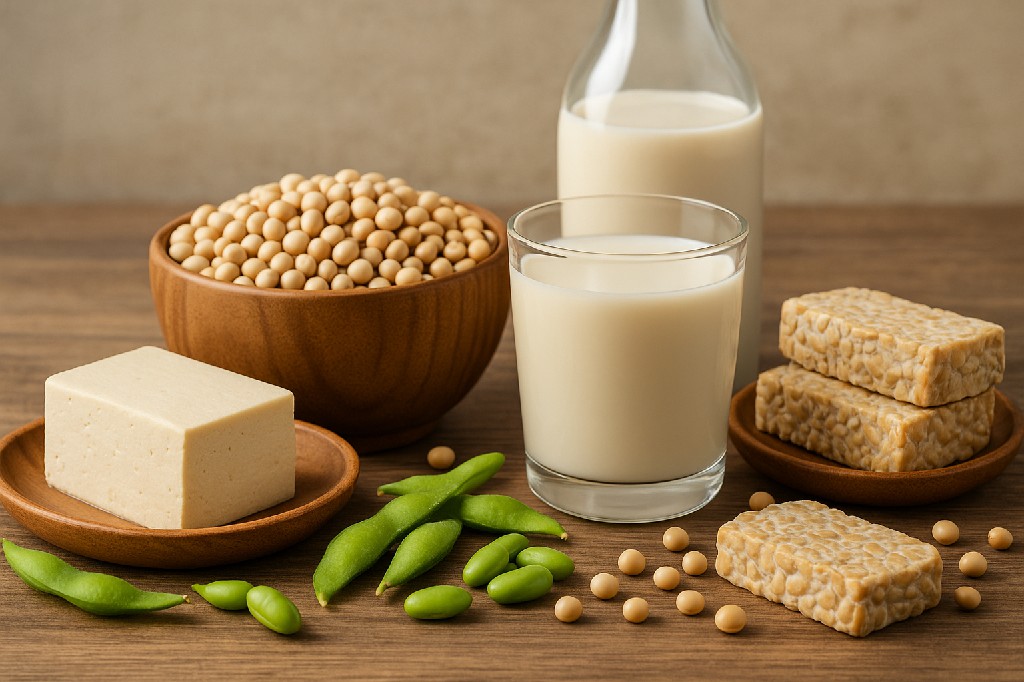Is Soy Good for Health? Discover the Truth
Is Soy Good for Health? Discover the Truth
For decades, soy has sparked passionate debates among nutritionists and health enthusiasts. From tofu to soy milk, this legume has been a staple in Asian diets for centuries. But is soy good for health? Although some myths persist, scientific research continues to reveal a more nuanced, and largely positive, picture. In this article, we explore the health effects of soy, separating facts from fiction and helping you decide if it deserves a place in your diet.

What Is Soy and Why It Matters
Soybeans are legumes native to East Asia and are rich in protein, fiber, and various vitamins and minerals. Because of their versatility, they are often used in vegetarian and vegan diets as a meat alternative. Furthermore, soy contains isoflavones, plant-based compounds that mimic estrogen in the body. This biochemical feature is often cited as a point of concern, but also a potential health benefit.
Nutritional Profile: Is Soy Good for Health?
When evaluating whether soy is good for health, it’s essential to look at its nutritional profile. A 100g serving of boiled soybeans contains:
- Protein: 16.6g
- Fiber: 6g
- Iron: 15.7% of the RDI
- Calcium: 10% of the RDI
- Magnesium: 19% of the RDI
- Vitamin K1: 25% of the RDI
Because soy provides all nine essential amino acids, it’s considered a complete protein, rare among plant-based foods. Additionally, it contains healthy unsaturated fats that support cardiovascular well-being.
Is Soy Good for Health in Heart Disease Prevention?
One of the strongest arguments for soy consumption lies in its cardiovascular benefits. In fact, numerous studies have found that soy protein can help lower LDL cholesterol, often referred to as “bad cholesterol.” According to the FDA, 25 grams of soy protein per day may reduce the risk of heart disease.
Moreover, the isoflavones in soy appear to improve arterial flexibility, which enhances blood flow and reduces blood pressure over time. Notably, these effects become more apparent when soy is used as a replacement for animal-based proteins.
Can Soy Help Balance Hormones?
A key question people ask is: Is soy good for health when it comes to hormones? Because soy contains phytoestrogens, some worry it may disrupt the endocrine system. However, most evidence suggests the opposite.
For example, in postmenopausal women, soy isoflavones have been shown to relieve hot flashes and improve bone density. In men, soy does not lower testosterone levels, debunking a common myth. Rather than disrupting hormones, soy appears to act as a natural modulator, balancing effects based on the body’s existing hormone levels.
Is Soy Good for Health in Cancer Prevention?
Another area where soy shines is cancer prevention, particularly breast and prostate cancers. Earlier studies raised concerns that soy might stimulate hormone-sensitive cancers. Nevertheless, updated research shows that moderate soy intake reduces breast cancer recurrence and may lower prostate cancer risk.
A review in The American Journal of Clinical Nutrition concluded that soy isoflavones may inhibit tumor growth and enhance the effectiveness of cancer treatments. Still, it’s important to note that results vary depending on genetic factors and gut microbiome composition.
Is Soy Good for Health in Bone Strength?
Osteoporosis is a growing concern, especially among aging populations. Interestingly, soy’s isoflavones may help improve bone mineral density. Although soy isn’t as rich in calcium as dairy, its compounds enhance calcium absorption and reduce bone resorption.
Additionally, women in East Asian countries, where soy intake is high, tend to have lower rates of hip fractures, suggesting a protective effect. So yes, when incorporated into a balanced diet, soy can contribute to long-term bone health.
Debunking Myths: Is Soy Safe for Everyone?
Let’s address a few persistent myths. First, soy is not genetically harmful. While much of the soy grown globally is GMO, the genetic modifications are designed to resist pests, not to alter nutritional content. Secondly, concerns about soy and thyroid function are largely exaggerated. Studies show that soy does not impair thyroid function in people with adequate iodine intake.
Lastly, soy allergies do exist, but they are more common in children and often outgrown with age. For most individuals, soy poses no health risks when consumed in moderation.
Is Soy Good for Health in Weight Management?
If you’re aiming to lose weight, soy can be a helpful ally. Its high protein content increases satiety, reducing overall calorie intake. Plus, the fiber helps regulate digestion and control blood sugar spikes. Consequently, soy-based meals often keep you fuller longer compared to other plant-based options.
Studies have also shown that soy protein may promote fat loss while preserving muscle mass, especially when combined with resistance training. This makes soy an ideal food for fitness enthusiasts and individuals managing their weight.
Best Forms of Soy to Consume
To gain the maximum benefits, opt for minimally processed soy products like:
- Edamame
- Tofu
- Tempeh
- Soy milk (unsweetened)
- Miso
These products retain the majority of the nutrients and offer a better isoflavone profile than heavily processed soy-based items, like soy protein isolate or soy-based meat substitutes, which often contain additives.
How Much Soy Is Too Much?
Moderation is key. Studies suggest that 1–2 servings per day of whole soy foods is both safe and beneficial. Excessive intake (more than 4 servings per day) may lead to imbalances, particularly in individuals with sensitive hormonal conditions. Nevertheless, within reasonable limits, soy is a safe and nutrient-rich addition to most diets.
Final Verdict: Is Soy Good for Health?
So, is soy good for health? The overwhelming body of evidence points to a resounding yes. From heart health and hormone balance to cancer prevention and weight management, soy offers a broad spectrum of science-backed benefits. However, as with any food, the context in which it is consumed matters. Prioritize whole soy sources, limit overly processed varieties, and incorporate soy as part of a diverse and balanced diet.
Takeaway
While no single food holds the secret to perfect health, soy comes impressively close. It delivers complete protein, valuable micronutrients, and potent plant compounds that support multiple systems in the body. Whether you’re vegetarian, health-conscious, or just curious, adding soy to your meals could be one of the simplest yet most effective dietary upgrades you make.
